Related Research Articles
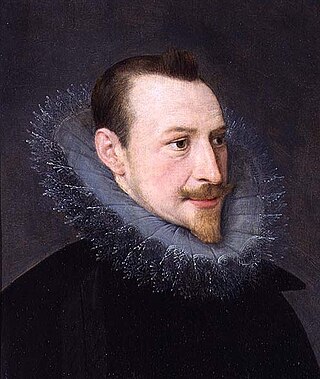
Edmund Spenser was an English poet best known for The Faerie Queene, an epic poem and fantastical allegory celebrating the Tudor dynasty and Elizabeth I. He is recognized as one of the premier craftsmen of nascent Modern English verse, and he is considered one of the great poets in the English language.

Hiberno-English or Irish English (IrE), also formerly sometimes called Anglo-Irish, is the set of English dialects native to the island of Ireland.
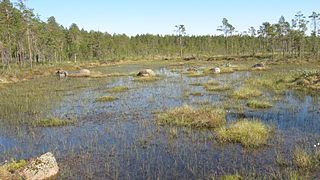
A bog or bogland is a wetland that accumulates peat as a deposit of dead plant materials – often mosses, typically sphagnum moss. It is one of the four main types of wetlands. Other names for bogs include mire, mosses, quagmire, and muskeg; alkaline mires are called fens. A bayhead is another type of bog found in the forest of the Gulf Coast states in the United States. They are often covered in heath or heather shrubs rooted in the sphagnum moss and peat. The gradual accumulation of decayed plant material in a bog functions as a carbon sink.
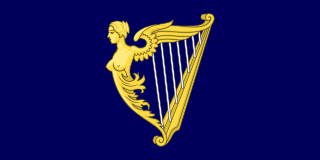
The Kingdom of Ireland was a monarchy on the island of Ireland that was a client state of England and then of Great Britain. It existed from 1542 until 1801. It was ruled by the monarchs of England and then of Great Britain, and was administered from Dublin Castle by a viceroy appointed by the English king: the Lord Deputy of Ireland. Aside from brief periods, the state was dominated by the Protestant English minority. The Protestant Church of Ireland was the state church. The Parliament of Ireland was composed of Anglo-Irish nobles. From 1661, the administration controlled an Irish army. Although styled a kingdom, for most of its history it was, de facto, an English dependency. This status was enshrined in Poynings' Law and in the Declaratory Act of 1719.

Cambridge University Library is the main research library of the University of Cambridge. It is the largest of over 100 libraries within the university. The library is a major scholarly resource for members of the University of Cambridge and external researchers. It is often referred to within the university as the UL. Thirty-three faculty and departmental libraries are associated with the University Library for the purpose of central governance and administration, forming "Cambridge University Libraries".
The Irish Statute Book, also known as the electronic Irish Statute Book (eISB), is a database produced by the Office of the Attorney General of Ireland. It contains copies of Acts of the Oireachtas and statutory instruments. It also contains a Legislation Directory which includes chronological tables of pre-1922 legislation. It is published on a website (irishstatutebook.ie) and was formerly published on CD-ROM.
The Lihir language is an Austronesian language spoken in the Lihir island group, in New Ireland Province, Papua New Guinea. It is notable for having five levels of grammatical number: singular, dual, trial, paucal and plural. It is questionable whether the trial is indeed trial or whether it is paucal, leaving there being a paucal and a greater paucal. Either way, this is the highest number of levels of grammatical number in any language. This distinction appears in both independent pronouns and possessor suffixes. There is some variation in pronunciation and orthography between the main island Niolam, and some of the smaller islands in the group.
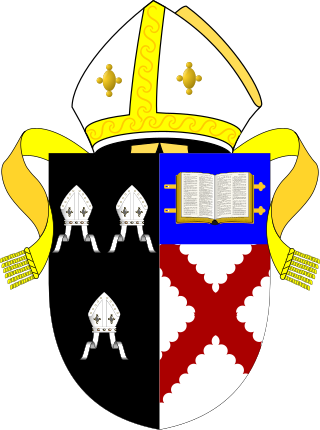
The United Dioceses of Meath and Kildare is a diocese in the Church of Ireland located in the Republic of Ireland. The diocese is in the ecclesiastical province of Dublin. Alone of English and Irish bishops who are not also archbishops, the Bishop of Meath and Kildare is styled "The Most Reverend".
Events from the year 1215 in Ireland.
Events from the year 1661 in Ireland.

The Archbishop of Armagh is an archiepiscopal title which takes its name from the city of Armagh in Northern Ireland. Since the Reformation, there have been parallel apostolic successions to the title: one in the Roman Catholic Church and the other in the Church of Ireland. The archbishop of each denomination also holds the title of Primate of All Ireland.
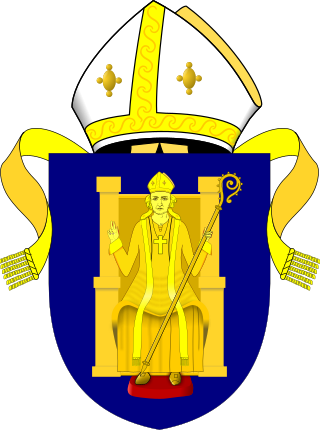
The Diocese of Clogher is a diocese of the Church of Ireland in the north of Ireland. It is in the ecclesiastical province of Armagh. It covers a rural area on the border between Northern Ireland and the Republic of Ireland including much of south west Ulster, taking in most of the counties Fermanagh and Monaghan and parts of counties Cavan, Leitrim and Donegal.
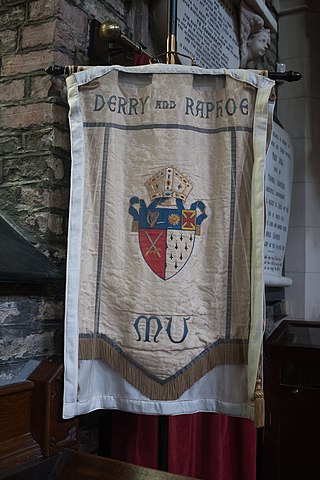
The Diocese of Derry and Raphoe is a diocese of the Church of Ireland in the north-west of Ireland. It is in the ecclesiastical province of Armagh. Its geographical remit straddles two civil jurisdictions: in Northern Ireland, it covers all of County Londonderry and large parts of County Tyrone while in the Republic of Ireland it covers County Donegal.

The Diocese of Down and Dromore is a diocese of the Church of Ireland in the south east of Northern Ireland. It is in the ecclesiastical province of Armagh. The geographical remit of the diocese covers half of the City of Belfast to the east of the River Lagan and the part of County Armagh east of the River Bann and all of County Down.
Events from the year 1476 in Ireland.
The Dictionary of Irish Biography (DIB) is a biographical dictionary of notable Irish people and people not born in the country who had notable careers in Ireland, including both Northern Ireland and the Republic of Ireland.
Events from the year 1591 in Ireland.
Events from the year 1447 in Ireland.
Anthony Martin was an Anglican priest in Ireland during the first half of the 17th-century.
Sir Thomas Page was an English academic.
References
- ↑ Fryde, E. B.; Greenway, D. E.; Porter, S.; Roy, I. (1986). Handbook of British Chronology (3rd ed.). Cambridge, UK: Cambridge University Press. ISBN 0-521-56350-X.
- ↑ "Fasti Ecclesiae Hibernicae: The succession of the prelates Volume 1" Cotton, H. p450: Dublin, Hodges & Smith, 1848-1878